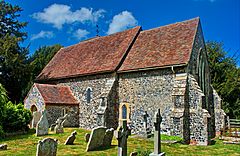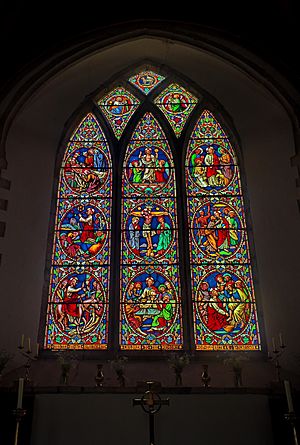Elmstone Church facts for kids
Quick facts for kids Elmstone Church |
|
|---|---|

South view of the church
|
|
| 51°17′46″N 1°14′31″E / 51.296°N 1.242°E | |
| Location | Elmstone, Kent |
| Country | England |
| Denomination | Anglican |
| History | |
| Status | Parish church |
| Architecture | |
| Functional status | Active |
| Heritage designation | Grade II* |
| Designated | 11 October 1963 |
| Architectural type | Church |
| Specifications | |
| Materials | Flint |
| Administration | |
| Parish | Elmstone with Preston and Stourmouth |
| Deanery | East Bridge |
| Archdeaconry | Canterbury |
| Diocese | Canterbury |
| Province | Canterbury |
| District | Dover |
Elmstone Church is a historic church located in the village of Elmstone in Kent, England. It belongs to the Anglican faith. This special building was first built way back in the 1200s! In 1963, it was recognized as a Grade II* listed building, which means it's a very important historical site. What's really interesting is that, unlike most churches, Elmstone Church isn't named after any particular saint.
Contents
Exploring Elmstone Church: History and Design
The oldest parts of Elmstone Church are the nave (the main part where people sit) and the lower chancel (the area near the altar). These sections were built during the Norman period, which was a long time ago! They are made from flint, a type of stone.
What the Church Looks Like
The chancel has a window on its north side, and the nave has two windows on its south side. All three of these windows have special stone tops and bottoms made from Caen stone, with flint sides. In the early 1300s, the church was updated. You can see this in the "Y-tracery" of the west window, which is a fancy pattern of stone bars. The east window also has a cool intersecting pattern.
The church was made bigger in the early 1300s. A north aisle (a side section) and a north-west tower were added. These new parts were built using carefully shaped knapped flint. The church also has square-shaped windows with "ogee" lights, which are curved, S-shaped designs. The main entrance, called the porch, is on the south side.
Inside the Church
Inside, there's an "arcade" of three sections from the 1200s. An arcade is a row of arches supported by columns. The columns, called piers, are eight-sided. The arches themselves are "double-chamfered," meaning they have two sloped edges.
The priest's special seat, called a stall, dates back to the 1300s. The pulpit, where the priest gives sermons, was designed in the late 1800s by Edward Schroeder Prior. It has "linenfold panels," which look like folded linen fabric, similar to designs by Charles Voysey.

Beautiful Stained Glass Windows
Elmstone Church has some amazing stained glass windows. Stained glass is made from many pieces of colored glass joined together to create pictures.
Windows in the Chancel and Aisle
In the east part of the chancel, there's a stained glass window that shows scenes from the Passion of Jesus. These scenes are set in round shapes, like those found in 12th-century art. In the east part of the north aisle, another stained glass window shows the Resurrection of Jesus. Both of these beautiful windows were made by an artist named William Wailes around 1863.
Other Special Windows
The west window in the nave has stained glass that shows the church's coat of arms. No one knows exactly when this window was made, but a historian named John Newman thinks it might be from around 1840. The north aisle also has a window made by Burlison and Grylls and another showing the Nativity (the birth of Jesus) by James Powell and Sons. You can also see a window on the south wall that shows a slightly unusual picture of saints from the 600s. The west window contains some very old medieval glass. The north chancel window has a medieval round picture of the Lamb of God, which is a symbol for Jesus.
Church Furniture and Memorials
The church has a font for baptisms that is very old, possibly from the 1100s or 1200s. It sits on five supports. The bowl of the font is made of Bethersden marble. It's square at the bottom and rounded at the top, with special anvil-shaped pieces connecting the two shapes. The rector's stall (a special seat) has four "poppyheads," which are decorative carvings often found on the ends of church pews or stalls.
There is also a memorial inside the church for Robert Jaques, who passed away in 1671. This monument was likely made by Joshua Marshall. It's built into the south side of the chancel and is made of black and white marble. At the top, there's a bust (a sculpture of a person's head and shoulders) with fabric draped in an old style.
 | DeHart Hubbard |
 | Wilma Rudolph |
 | Jesse Owens |
 | Jackie Joyner-Kersee |
 | Major Taylor |


